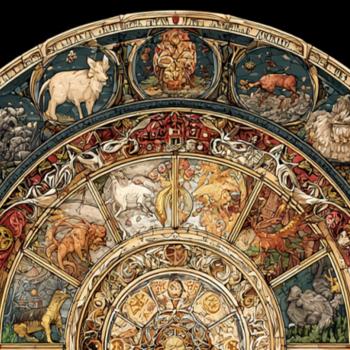
Reading through David Bentley-Hart’s New Testament translation each night before I go to sleep has been challenging. Mostly because I tend to discover something I haven’t noticed before and it keeps my mind working all night trying to make sense of it.
Last night was such a night.
Wendy and I read through chapter 11 of the Gospel of John and there was a notation about an alternate way of rendering Jesus’s words about the fate of those who put their hope in him.
Here’s the verse that hit me:
“Jesus said to her, “I am the resurrection and the life; whoever has faith in me, even if he should die, shall live, and whosoever lives and has faith in me most certainly does not die until the Age to come.” [v.25-26]
Now, most of the popular English translations render this quite differently and leave out the qualifier “…until the Age to come”, but David Bentley-Hart correctly includes the literal phrasing which suggests that what Jesus is talking about is more about the end of the current age and the beginning of the next one. (Not about where we go after we die).
So, the implication here, with the new translation, is that those who follow Jesus will die, but only after the end of that current age in which Jesus was speaking. In other words, those who put their trust in Jesus will not die in the present age, but they will live to see the new age to come.
This is key because, to those listening to him speak, the “end of the age” referred to the “Day of the Lord” which was the last, great judgment.
But, this judgement was not carried out in some mystical heavenly throne room in the clouds, it was a very real judgement carried out by literal armies that surrounded Jerusalem and destroyed the temple, the priesthood and ended the daily sacrifice.
This violent end of the age took place on T’sha B’av in AD 70. Those who refused to follow (or to put their trust in) the message of Jesus, were slaughtered by the Roman army. Quite literally, they lived by the sword and therefore died by the sword, as Jesus warned.
However, those who did trust in the cheek-turning, enemy-loving message of Jesus escaped that violence. History records that the Christians in Jerusalem were warned to flee months before the Roman army surrounded the city by a series of prophetic words. Because of this, the Christians fled to the nearby region of Pella, across the Jordan river.
This is testified to in several places, for example:
“The people of the Church in Jerusalem were commanded by an oracle given by revelation before the war to those in the city who were worthy of it to depart and dwell in one of the cities of Perea which they called Pella. To it those who believed on Christ traveled from Jerusalem, so that when holy men had altogether deserted the royal capital of the Jews and the whole land of Judaea…” — Eusebius, Church History 3
“This heresy of the Nazoraeans exists in…the region of Pella… From there it took its beginning after the exodus from Jerusalem when all the disciples went to live in Pella because Christ had told them to leave Jerusalem and to go away since it would undergo a siege. Because of this advice they lived in Perea after having moved to that place, as I said.” — Epiphanius, Panarion 29
“So Aquila, while he was in Jerusalem, also saw the disciples of the disciples of the apostles flourishing in the faith and working great signs, healings, and other miracles. For they were such as had come back from the city of Pella to Jerusalem and were living there and teaching. For when the city was about to be taken and destroyed by the Romans, it was revealed in advance to all the disciples by an angel of God that they should remove from the city, as it was going to be completely destroyed. They sojourned as emigrants in Pella…” — Epiphanius, On Weights and Measures 15
So, David Bentley Hart’s translation confirms my long-held suspicions that when Jesus talks about “eternal life” or “salvation” he is not usually talking about what happens to us after we die. Instead, he is referring to the end of the age that was prophesied by Daniel. He’s referring to the beginning of a brand new age that is marked by the New Covenant that Jesus made with his disciples in the upper room.
If we re-read that passage in Chapter 11 of the Gospel of John, we see that Jesus is saying something very practical about the fate of those who trust in his teaching and put it into practice, and the fate of those who refuse to do so.
The end of the age was coming very quickly. As Jesus had promised, it would take place in the lifetime of many of those who were standing with him.
Let’s break down what Jesus is actually saying now, in context:
“I am the resurrection and the life; whoever has faith in me, even if he should die, shall live…
Meaning: This is a promise that Jesus is our life. So, for those who die before the end of the age, there is the hope of life beyond this one.
“…and whosoever lives and has faith in me most certainly does not die until the Age to come.” [v.25-26]
Meaning: Those who don’t die before the end of the age, but put the words of Jesus into practice now, will survive unto the beginning of the next Age. (But they may still die after the Age to come).
This reading provides a much more accurate picture of what Jesus was communicating in these verses, I believe.
So, either way, those who trust in Christ will die: They will either die before the end of the Age comes – but if so they are promised life beyond this one – or they will live until the current Age ends and the new one begins – but still die after the Age to come.
(Because the promise Jesus makes is that one will not die “until the Age to come”).
This verse is not ultimately about going to heaven when we die, although there is a hint of that in the first half of the verse. Instead, the overall meaning is that by putting the words of Jesus into practice now, one might sow seeds of peace and reap the life of the age to come.
Either way, however, death is inevitable. And this should come as no surprise since Jesus also said that no one could follow him unless they first took up their cross daily, died to themselves, and put his words into practice.
So, death is assumed from the very beginning.
Personally, I am very intrigued by this message and what it meant for those who heard it.
What do you think?
**
Keith Giles was formerly a licensed and ordained minister who walked away from organized church 11 years ago, to start a home fellowship that gave away 100% of the offering to the poor in the community.
His new book “Jesus Unbound: Liberating the Word of God from the Bible”, is available now on Amazon and features a Foreword by author Brian Zahnd.
He is also the author of the Amazon best-seller, “Jesus Untangled: Crucifying Our Politics To Pledge Allegiance To The Lamb” with a Foreword by Greg Boyd.
Keith also co-hosts the Heretic Happy Hour Podcast on iTunes and Podbean. He and his wife live in Meridian, Idaho, awaiting their next adventure.
BONUS: Want to unlock exclusive content including blog articles, short stories, music, podcasts, videos and more? Visit my Patreon page.













